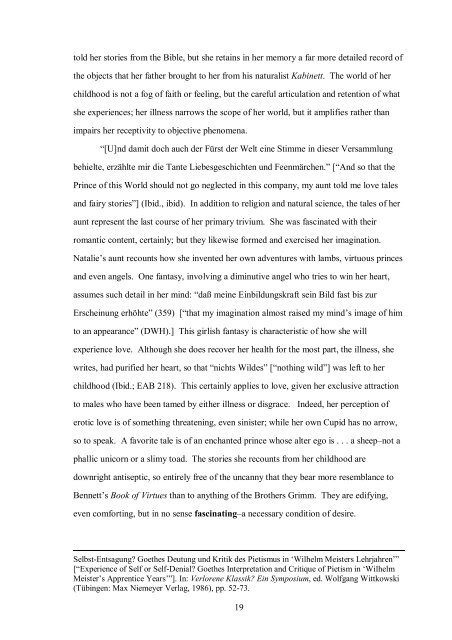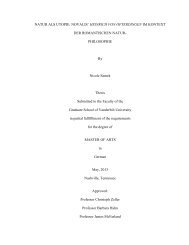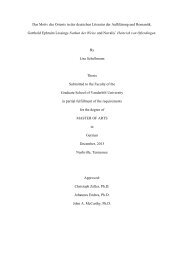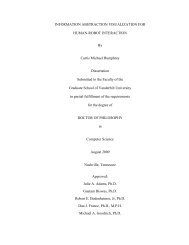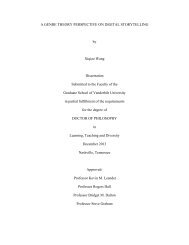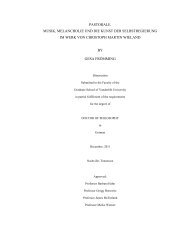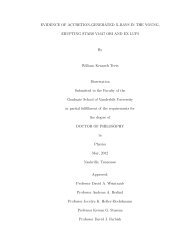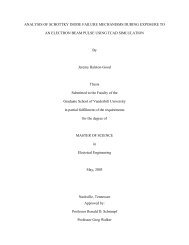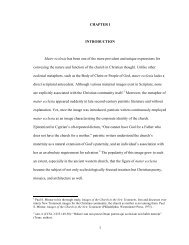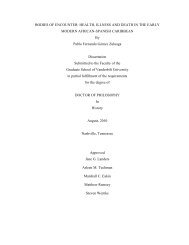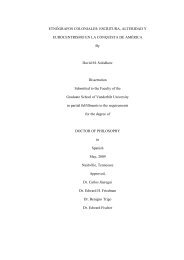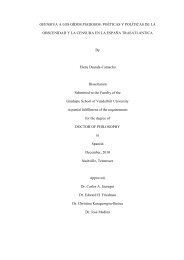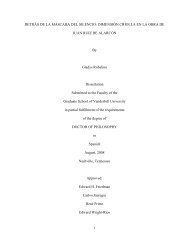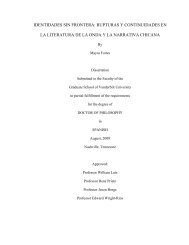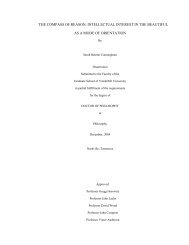THE DEATH OF DIONYSOS - ETD - Vanderbilt University
THE DEATH OF DIONYSOS - ETD - Vanderbilt University
THE DEATH OF DIONYSOS - ETD - Vanderbilt University
Create successful ePaper yourself
Turn your PDF publications into a flip-book with our unique Google optimized e-Paper software.
told her stories from the Bible, but she retains in her memory a far more detailed record of<br />
the objects that her father brought to her from his naturalist Kabinett. The world of her<br />
childhood is not a fog of faith or feeling, but the careful articulation and retention of what<br />
she experiences; her illness narrows the scope of her world, but it amplifies rather than<br />
impairs her receptivity to objective phenomena.<br />
“[U]nd damit doch auch der Fürst der Welt eine Stimme in dieser Versammlung<br />
behielte, erzählte mir die Tante Liebesgeschichten und Feenmärchen.” [“And so that the<br />
Prince of this World should not go neglected in this company, my aunt told me love tales<br />
and fairy stories”] (Ibid., ibid). In addition to religion and natural science, the tales of her<br />
aunt represent the last course of her primary trivium. She was fascinated with their<br />
romantic content, certainly; but they likewise formed and exercised her imagination.<br />
Natalie’s aunt recounts how she invented her own adventures with lambs, virtuous princes<br />
and even angels. One fantasy, involving a diminutive angel who tries to win her heart,<br />
assumes such detail in her mind: “daß meine Einbildungskraft sein Bild fast bis zur<br />
Erscheinung erhöhte” (359) [“that my imagination almost raised my mind’s image of him<br />
to an appearance” (DWH).] This girlish fantasy is characteristic of how she will<br />
experience love. Although she does recover her health for the most part, the illness, she<br />
writes, had purified her heart, so that “nichts Wildes” [“nothing wild”] was left to her<br />
childhood (Ibid.; EAB 218). This certainly applies to love, given her exclusive attraction<br />
to males who have been tamed by either illness or disgrace. Indeed, her perception of<br />
erotic love is of something threatening, even sinister; while her own Cupid has no arrow,<br />
so to speak. A favorite tale is of an enchanted prince whose alter ego is . . . a sheep–not a<br />
phallic unicorn or a slimy toad. The stories she recounts from her childhood are<br />
downright antiseptic, so entirely free of the uncanny that they bear more resemblance to<br />
Bennett’s Book of Virtues than to anything of the Brothers Grimm. They are edifying,<br />
even comforting, but in no sense fascinating–a necessary condition of desire.<br />
Selbst-Entsagung? Goethes Deutung und Kritik des Pietismus in ‘Wilhelm Meisters Lehrjahren’”<br />
[“Experience of Self or Self-Denial? Goethes Interpretation and Critique of Pietism in ‘Wilhelm<br />
Meister’s Apprentice Years’”]. In: Verlorene Klassik? Ein Symposium, ed. Wolfgang Wittkowski<br />
(Tübingen: Max Niemeyer Verlag, 1986), pp. 52-73.<br />
19


